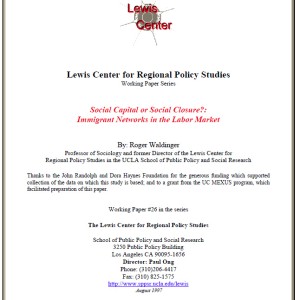
Authors: Roger D. Waldinger
Date: August 1, 1997
Project: [wpv-post-link id=”$project”]
This paper offers a reconsideration and reconceptualization of the role of immigrant social networks in the labor market. As the literature suggests, and as I show, the social connections among workers, and between workers and employers, facilitate economic action; network recruitment is so pervasive because it improves the quality and quantity of information that both workers and employers need, and also shapes the employment relationship by imparting a set of understandings common to workers and employers. But once imported into a workplace, immigrant networks can be turned to other ends; the social closure potential of immigrant networks can also serve as an instrument for reallocating resources from management to labor, while simultaneously increasing opportunities for one group of ethnically distinctive workers at the expense of another. This effort to increase rewards by restricting access to resources and opportunities to a limited circle of eligibles generates an expansionary thrust, extending the penetration of immigrant networks beyond the range defined by considerations of an efficiency sort. I apply the neo-Weberian concepts of “exclusionary,” “usurpationary,” and “dual” closure to demonstrate how immigrant networks expand their reach.
Link to Publication